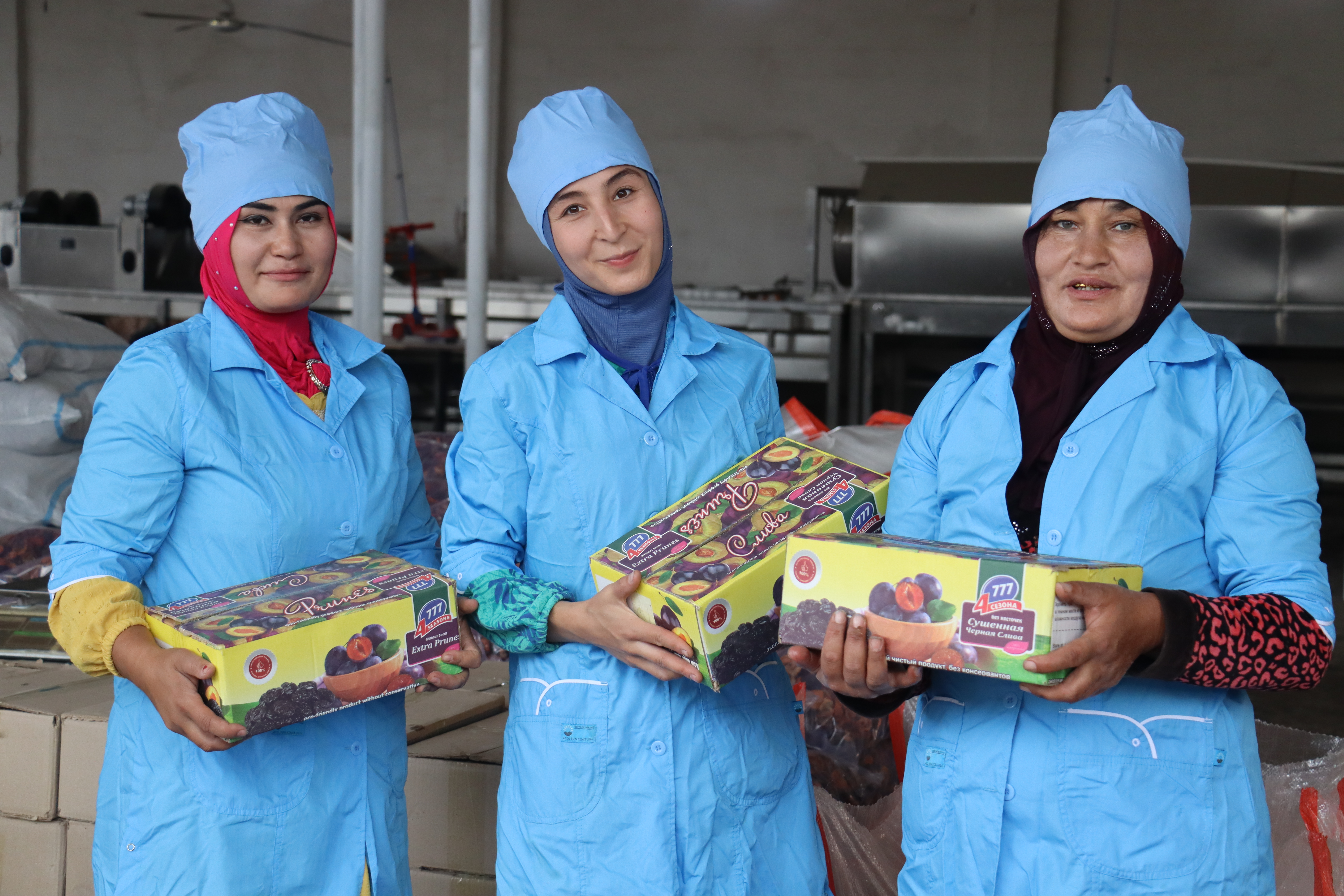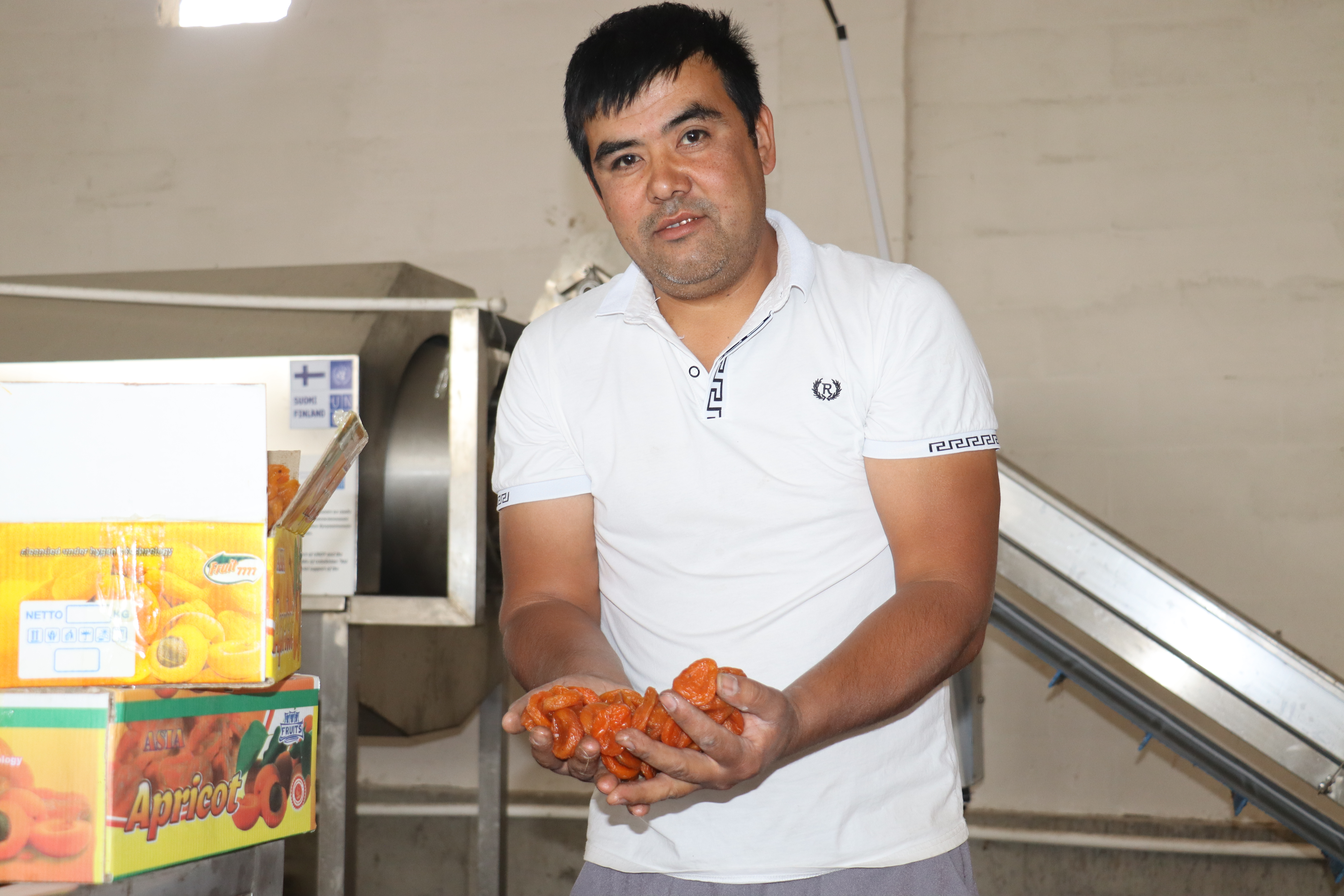Author: Oytun Elacmaz, Communications Specialist, Inclusive Growth Team, UNDP IRH
Fostering Economic Resilience through Green Value Chains
January 19, 2024

In Uzbekistan, more than 130,000 stallholder farms are dispersed throughout the country, with plots in different sizes yielding abundantly various fruits and vegetables, frequently sold in local markets and consumed fresh. More and more, however, the country’s producers diversify their trade and production patterns, tapping into the potential of value-added products through processing their raw agricultural produce. These value-added goods and their value chains create a positive impact on livelihoods in different parts of the country. With emerging trade and market relations, they are also becoming a more substantial item in Uzbekistan’s exports. In 2022, the export volume of processed fruits, vegetables and nuts amounted to 45,18 million US dollars, a 50 percent increase compared to 2012.
UNDP has been supporting the Government of Uzbekistan to harness the potential of trade and value chains to contribute to building economic resilience and sustainable development pathways. Through Aid for Trade in Central Asia project, funded by the Government of Finland, we engage with Uzbekistan’s MSMEs and farmers in rural areas of Fergana Valley in improving their productive and export capacities along such green and niche value chains as mixtures of dried fruits and nuts, peanuts and peanut butter, mung beans, and jams and fruit purees.
By promoting the development of ‘green’ value chains, UNDP aims to increase economic opportunities, introduce innovations in production operations, upgrade technologies and practices, and integrate smallholder farmers into upstream value addition activities.
Three stories from our engagements with three small businesses in different regions of Fergana Valley of Uzbekistan illustrate our concrete support to MSMEs in building ‘forward-looking’ productive and export capacities and promoting green value chains. They also show how green value chains prompt the creation of jobs and local development with their capacity to steer a positive change towards more resilient, inclusive, and sustainable economies.
Ruzigul’s jam production
For Ruzigul Anorkulova, food-processing began as a hobby that also generated supplementary income to her job as a teacher in Chust city in Namangan region, producing jams and marmalades in addition to selling fresh fruits in local markets. Soon, agriculture and entrepreneurship became a passion, and as she aged into her retirement years, she decided to pursue a more ambitious project. Thus, in 2016, ‘Gulroz-D’ LLC was founded.
Jam production was home-based and manual; summer and autumn were busy while it was rather dormant in other seasons, which stymied a stable revenue. To overcome this challenge, UNDP supported it for the semi-automatization of jam production process. With a simple, yet efficacious intervention that provided the equipment, Gulroz-D easily became a substantial contributor to the local economy, with jam production capacity of 300 cans per day and the business generating more stable income independent of seasonal fluctuations. Before, the company relied solely on its own orchard for raw supply: now, it contracted 3 other producers. More supply generated more employment: Gulroz-D is now able to employ 6 people, 5 of whom are women.
Once a teacher, Ruzigul does not refrain her knowledge and guidance from other young and curious entrepreneurs, most of whom are women. Nevertheless, there are things to learn for her to discover and learn, too. She makes future projections for exporting to European countries and Turkey. This requires acquiring international certifications and complying with standards of export markets. With the UNDP trainings targeting such knowledge gap, the chances are high that Gulroz-D will draw attention to its processed fruit products and export to interested markets.
Otabek’s fruit and berry purees
In Andijan region of Uzbekistan, with its abundant agricultural production, the future of food processing sector was propitious. This was the primary take away from a local business meeting with the governor for Otabek Ziyayev, the founder and head of ‘Cibus Natural’ LLC. In 2018, Cibus Natural started to produce jams, positioned as ecological and healthy consumer goods.
Then, in a local exhibition, fermented milk product companies approached Cibus Natural with a proposal. The fruit and berry fillers they used, mostly in puree form, were exclusively imported goods from Russia and Belarus. If Cibus Natural could produce this ingredient, they would be very interested in the local supply. However, initial talks also revealed that the company must make some adjustments to be on par with their quality and safety standards; companies such as ‘Rash-Milk Plus’ LLC conditioned that the fruit purees were filled into and transported in aseptic packages to ensure sterility and longer shelf life.
Cibus Natural found UNDP as a partner who would accompany them throughout the change. First, the Aid for Trade project supported them with the crucial acquisition of the aseptic-filling machine. Complementing it, Cibus joined a set of training courses on planning, value chain creation, international certification and quality standards, and lastly, navigating export opportunities. After the new production line was in place, it was immediately reflected in increased production capacity (almost doubled), breadth of product line, and new jobs (10) created for vulnerable people. Now, Cibus aims to stand firm and competitive in the local market as a supplier of tasty fruit and berry puree ingredients. But for the long term, they plan to advance their front for exports. And quality and organic certification of their products are already in place, foreseen to be concluded in the upcoming months.
Dried fruits and legumes of Garden House
A dried fruits producer located in Ferghana city, Garden House LLC has long been aspiring to expand their export geography. For this purpose, the business has actively sought to increase product visibility and build client relations in international exhibitions in Central Asia and beyond, particularly in Western Europe and the United States. Garden House has come to learn a lot from these experiences, grasping the significance of packaging for building trust in export markets, as well as the crucial standards and regulations for food safety and longer shelf life without using additives.

In their facility, all the work was conducted manually from product reception to primary packaging, eliciting many challenges, especially during the height of the harvest as it slowed down the processing and it risked the safety compliances. Then, with Aid for Trade partnership, Garden House upgraded its operations for more capacity and productivity through the supply of an inspection table, washing machine, conveyor belts, drying and packaging machine. The results were remarkable: 16 new jobs, 10 of which is for women and a daily production capacity of 2500 tons. Now, also thanks to many contracted local farmers who understand the quality and safety standards required by Garden House, they have boosted the volume of their export contracts with Poland, Germany, the USA amounting to more than 2 million US dollars. Mirzokhid Niyazov, the CEO and core shareholder of the business, is now able to state:
From farmer to the end client, every single value chain step is monitored and transparent. We can say that we are completely ready to export every single one of our agricultural products to the European countries and United States and ready to cooperate.Mirzokhid Niyazov, CEO of the Garden House LLC
Aid for Trade in Central Asia project, funded by the Government of Finland, has been implemented in Uzbekistan since 2012. The project's phase IV focusses on four selected value chains: mixes of dried fruits and nuts; peanut and peanut butter; mung beans; jams, jellies, and fruit purees. These prioritized value chains were selected as their production can harness Uzbekistan's natural and ecological resources sustainably while growing in size, improving quality, increasing exports, and creating decent new jobs for all, especially women. The main objective of the AfT project is to support Central Asian countries in promoting inclusive and sustainable growth by developing green value chains, making economies more competitive, and enabling more resilient, secure and gender-responsive economic structures through economic diversification and adaptation to new trends brought about by COVID-19 and other external shocks.

 Locations
Locations











